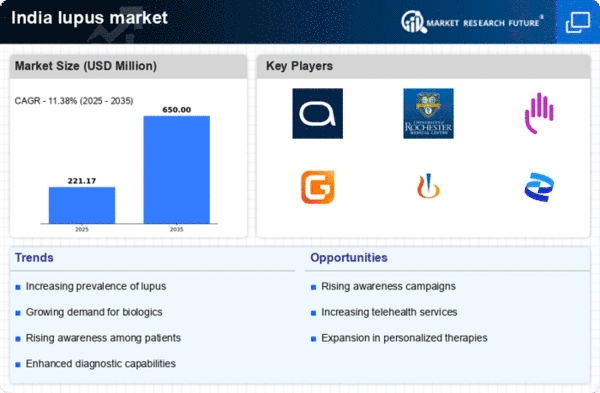Rising Healthcare Expenditure
The increase in healthcare expenditure in India is a vital factor influencing the lupus market. With the government's commitment to improving healthcare infrastructure and access, total healthcare spending is projected to reach approximately $370 billion by 2025. This rise in expenditure is expected to enhance the availability of lupus treatments and diagnostic services. As more patients gain access to healthcare, the demand for lupus-related services is likely to grow. Consequently, the lupus market may experience a surge in both pharmaceutical and non-pharmaceutical interventions, driven by the increased financial resources allocated to healthcare.
Increasing Prevalence of Lupus
The rising incidence of lupus in India is a critical driver for the lupus market. Recent studies indicate that the prevalence of lupus is approximately 5 per 100,000 individuals, with a notable increase in cases among women aged 15 to 44. This growing patient population necessitates enhanced healthcare services and treatment options, thereby expanding the market. The lupus market is likely to experience growth as healthcare providers focus on developing targeted therapies and personalized medicine. Furthermore, the increasing number of diagnosed cases is expected to drive demand for diagnostic tools and treatment modalities, contributing to the overall expansion of the lupus market in India.
Enhanced Diagnostic Capabilities
Advancements in diagnostic technologies are significantly impacting the lupus market. The introduction of more sensitive and specific diagnostic tests, such as anti-dsDNA and anti-Smith antibodies, has improved the accuracy of lupus diagnoses. This is crucial, as early detection can lead to better management of the disease and improved patient outcomes. The market for diagnostic tools is projected to grow, with an estimated CAGR of 8% over the next five years. As healthcare facilities adopt these advanced diagnostic methods, the lupus market is likely to benefit from increased patient referrals and treatment initiation, ultimately enhancing the overall market landscape.
Patient Advocacy and Support Groups
The emergence of patient advocacy and support groups is playing a pivotal role in shaping the lupus market. These organizations are instrumental in raising awareness about lupus, providing education, and supporting patients and their families. In India, the establishment of various lupus foundations has led to increased public knowledge and understanding of the disease. This heightened awareness is likely to encourage more individuals to seek medical attention, thereby increasing the patient population. As the lupus market expands, these advocacy groups may also influence policy changes and funding allocations, further enhancing the market environment for lupus treatments and services.
Growing Investment in Research and Development
Investment in research and development (R&D) for lupus treatments is a significant driver for the lupus market. Pharmaceutical companies are increasingly allocating resources to discover novel therapies, including biologics and small molecules. In India, the R&D expenditure in the healthcare sector has seen a rise, with an estimated 12% increase in funding for autoimmune diseases. This focus on innovation is likely to yield new treatment options, which could transform the management of lupus. As new therapies enter the market, they may provide better efficacy and safety profiles, thereby attracting more patients and healthcare providers to the lupus market.
















